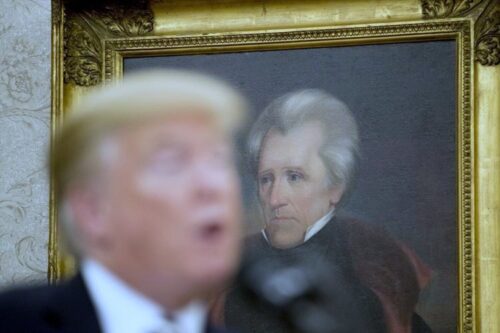Kudos to writer Cory Doctorow for his high-profile entry-level economics literacy campaign. I have to assume there’s an audience for his ideas, because people don’t know basic economics?
It’s a fancy new spin on old ideas: the monopoly rent-seeking, regulatory capture, and market power dynamics he describes are retreads from decades of prior writers.
Interesting that he invokes one prior theory, while not admitting to all the others he is borrowing from:
In the same way that Tim Berners-Lee rolled out of bed one morning and said, “The web is too important for me to take out a patent on it. Everyone’s gonna be able to use it.” And the way Jonas Salk said, “The polio vaccine is too important.” He said that owning this vaccine would be like owning the sun, so he didn’t patent it. I’m not a “Great Man of History” guy by any stretch, but I think those people show us the downstream effect of being a real mensch when you start something, just a really solid person, and how it can create a durable culture where there’s an ethos of kindness and care.
Right. Cory is definitely not a man of history, as that interview is basically just repeating textbook stuff well understood since… Stigler “Theory of Economic Regulation” in 1971? Mancur Olson in 1965 “The Logic of Collective Action”? Earlier if you count the trust-busters. Brandeis and the Clayton Act, 1914? Tarbell and Standard Oil, 1904? Veblen in 1899? Sherman Act of 1890?
The HUGE elephant in the room is… are we at a point where basic entry-level economics is served as a “big new idea” to gain traction? Apparently we can’t have normal policy debates using actual technical language anymore, it has to be injected through a viral hook. Part of that blame goes to the toxic ideology that leaked out of the Chicago School labs, which for 40 years misled people that monopoly concerns were outdated/debunked. So now this generation has to rediscover what the previous ones warned about over and over.
Thanks Shit-cago.
Consider this timeline. Tim Wu coined “attention merchants” in 2016 to describe what? Advertising. Leave it to marketing to decide a new term for advertising will sell more books. And then Lina Khan’s 2017 “Amazon’s Antitrust Paradox” paper was treated as groundbreaking when it basically rebranded pre-1980s antitrust theory by using the word “platform”. Ooh. Wait until you hear what happened next. Zuboff’s book “Surveillance capitalism” in 2019 was heavily promoted as a concept where companies were collecting data to sell ads. Shocking if true!
| Original Concept (1970s) | 1990s Rebrand | 2010s Rebrand |
|---|---|---|
| Monopoly | Platform power | Enshittification |
| Externalities | Spillover effects | Systemic risk |
| Information asymmetry | Knowledge gaps | Dark patterns |
| Rent-seeking | Value extraction | Wealth transfer |
We’ve built a system where expert consensus doesn’t matter, historical knowledge doesn’t accumulate, and basic economic principles have to be rediscovered and remarketed every generation to gain traction.
That’s… wait for it… the shitification.
It’s not how knowledge is supposed to work in a functioning civilization.
To be fair, Doctorow himself becomes a fascinating foil about someone who can’t decide if he’s more into determinism or contingency in economic history:
- Determinism: Once the internet became commercially important, monopolization was inevitable under capitalist logic. The specific policies were just accelerants.
- Contingency: Different regulatory choices in the 1990s/2000s could have produced genuinely different market structures (more like the pre-consolidation internet).
Doctorow is in the middle, but leaning contingent—we could have had mandatory interoperability, stronger privacy law, preserved rights to modify purchased tech, etc. And those structural guardrails would have prevented monopolization regardless of who the entrepreneurs were.
The specific mechanisms (DMCA preventing competitive modification, stock-as-currency fueling consolidation, KPI-driven enshittification) are really just some lower-level institutional details within basic economic theory.
Of course, this amnesia about economic predation isn’t new—it’s embedded in how the country commemorates its predators. It’s bad that economic theory keeps getting forgotten and rebranded (intellectual amnesia), but underneath is something even worse! American predators exploiting the cycles are elevated and celebrated (moral amnesia).
Am I right? Epstein files, cough, cough.
America still brazenly celebrates the worst of the worst men like Stanford, Polk, Jackson… does anyone really believe a Bezos, Musk or Zuckerberg isn’t going to exploit the same loopholes if they haven’t been closed.
Stanford?
Yes, that supposed great man of history was “a primary facilitator of genocide”, who oversaw Native American policy in the California legislature. His “killing machine” legacy is feted as if the true engine of Silicon Valley, a man implicated in fraud and genocide.
- “Killing machine” is Benjamin Madley’s term of art from “An American Genocide” (Yale University Press, 2016), referring to the system of US soldiers, California militia, volunteers, and mercenaries that California officials created.
- Stanford served on the Committee on Indian Affairs in the California state legislature in the 1850s, then as Governor (1862-1863) signed appropriations bills specifically funding extermination campaigns against California ethnic groups.
- The population rapidly dropped from 150,000 or more, to less than 12,000 survivors. Multiple sources (UCLA’s Madley, California State Library, SF Chronicle) have all confirmed Stanford “helped facilitate genocide.”
Yeah, giant loopholes. Like the one Stanford still proves.
They not only haven’t been closed but people walk around boasting that they went to Stanford. They literally put his name on their hats and clothing. It’s very strange for anyone who understands history, let alone economic theories of monopoly based on annihilation. Can you imagine a Stalin hat, or a Pol Pot sweatshirt?

I mean seriously, the White House didn’t give a clue here about loopholes in economic history of America when they said they’d bring Jackson’s ideas back, another American known for fraud and genocide?

Is Doctorow useful? Entertaining, maybe. But if “enshittification” doesn’t bring actual antitrust enforcement back again, we’re just waiting for a 2045 reboot.